笔记
单击此处 下载完整的示例代码
标记参考#
markerMatplotlib 支持使用绘图命令参数选择的多种标记类别:
有关所有标记的列表,另请参阅matplotlib.markers文档。
例如用法参见 标记示例。
from matplotlib.markers import MarkerStyle
import matplotlib.pyplot as plt
from matplotlib.lines import Line2D
from matplotlib.transforms import Affine2D
text_style = dict(horizontalalignment='right', verticalalignment='center',
fontsize=12, fontfamily='monospace')
marker_style = dict(linestyle=':', color='0.8', markersize=10,
markerfacecolor="tab:blue", markeredgecolor="tab:blue")
def format_axes(ax):
ax.margins(0.2)
ax.set_axis_off()
ax.invert_yaxis()
def split_list(a_list):
i_half = len(a_list) // 2
return a_list[:i_half], a_list[i_half:]
未填充的标记#
未填充的标记是单色的。
fig, axs = plt.subplots(ncols=2)
fig.suptitle('Un-filled markers', fontsize=14)
# Filter out filled markers and marker settings that do nothing.
unfilled_markers = [m for m, func in Line2D.markers.items()
if func != 'nothing' and m not in Line2D.filled_markers]
for ax, markers in zip(axs, split_list(unfilled_markers)):
for y, marker in enumerate(markers):
ax.text(-0.5, y, repr(marker), **text_style)
ax.plot([y] * 3, marker=marker, **marker_style)
format_axes(ax)
plt.show()
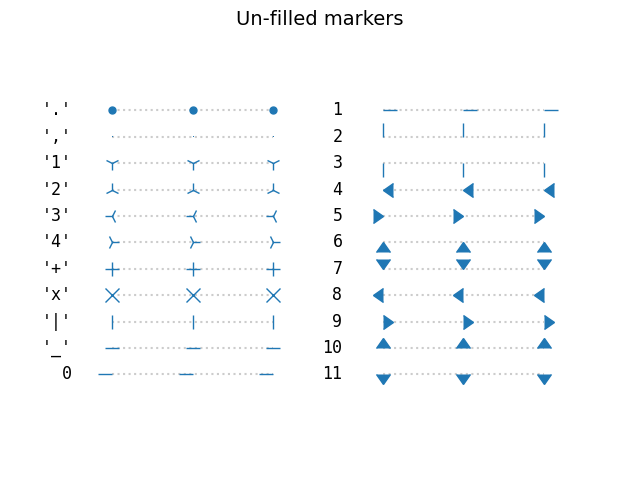
填充标记#
fig, axs = plt.subplots(ncols=2)
fig.suptitle('Filled markers', fontsize=14)
for ax, markers in zip(axs, split_list(Line2D.filled_markers)):
for y, marker in enumerate(markers):
ax.text(-0.5, y, repr(marker), **text_style)
ax.plot([y] * 3, marker=marker, **marker_style)
format_axes(ax)
plt.show()

标记填充样式#
填充标记的边缘颜色和填充颜色可以单独指定。此外,fillstyle可以将其配置为在各个方向上未填充、完全填充或半填充。半填充样式
markerfacecoloralt用作辅助填充颜色。
fig, ax = plt.subplots()
fig.suptitle('Marker fillstyle', fontsize=14)
fig.subplots_adjust(left=0.4)
filled_marker_style = dict(marker='o', linestyle=':', markersize=15,
color='darkgrey',
markerfacecolor='tab:blue',
markerfacecoloralt='lightsteelblue',
markeredgecolor='brown')
for y, fill_style in enumerate(Line2D.fillStyles):
ax.text(-0.5, y, repr(fill_style), **text_style)
ax.plot([y] * 3, fillstyle=fill_style, **filled_marker_style)
format_axes(ax)
plt.show()
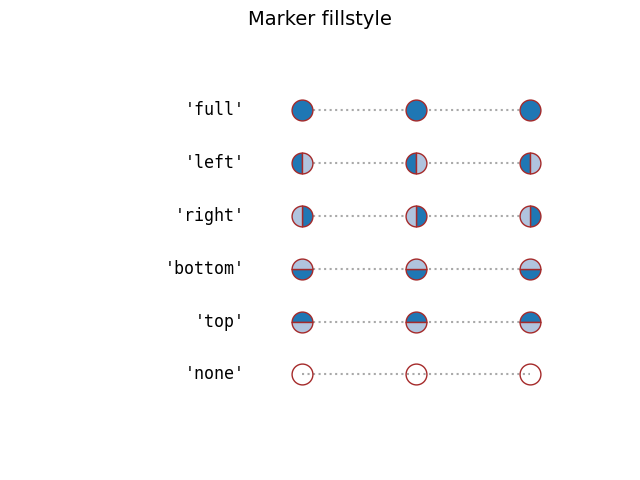
从 TeX 符号创建的标记#
使用MathText来使用自定义标记符号,例如"$\u266B$". 有关 STIX 字体符号的概述,请参阅STIX 字体表。另请参阅STIX 字体。
fig, ax = plt.subplots()
fig.suptitle('Mathtext markers', fontsize=14)
fig.subplots_adjust(left=0.4)
marker_style.update(markeredgecolor="none", markersize=15)
markers = ["$1$", r"$\frac{1}{2}$", "$f$", "$\u266B$", r"$\mathcal{A}$"]
for y, marker in enumerate(markers):
# Escape dollars so that the text is written "as is", not as mathtext.
ax.text(-0.5, y, repr(marker).replace("$", r"\$"), **text_style)
ax.plot([y] * 3, marker=marker, **marker_style)
format_axes(ax)
plt.show()
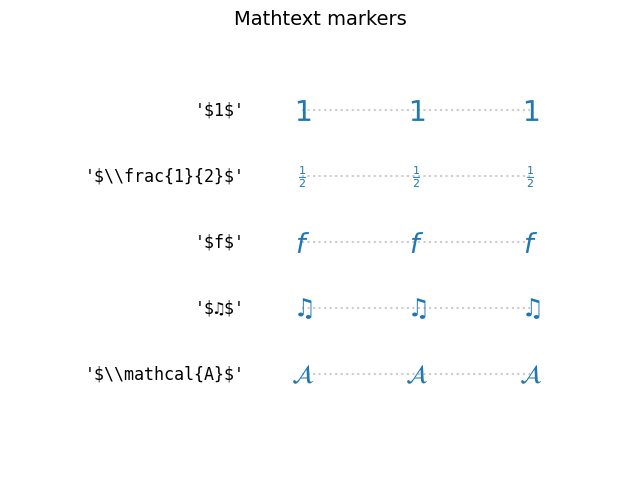
从路径创建的标记#
任何Path都可以用作标记。下面的示例显示了两条简单的路径star和circle,以及更精细的带有切割星形的圆的路径。
import matplotlib.path as mpath
import numpy as np
star = mpath.Path.unit_regular_star(6)
circle = mpath.Path.unit_circle()
# concatenate the circle with an internal cutout of the star
cut_star = mpath.Path(
vertices=np.concatenate([circle.vertices, star.vertices[::-1, ...]]),
codes=np.concatenate([circle.codes, star.codes]))
fig, ax = plt.subplots()
fig.suptitle('Path markers', fontsize=14)
fig.subplots_adjust(left=0.4)
markers = {'star': star, 'circle': circle, 'cut_star': cut_star}
for y, (name, marker) in enumerate(markers.items()):
ax.text(-0.5, y, name, **text_style)
ax.plot([y] * 3, marker=marker, **marker_style)
format_axes(ax)
plt.show()
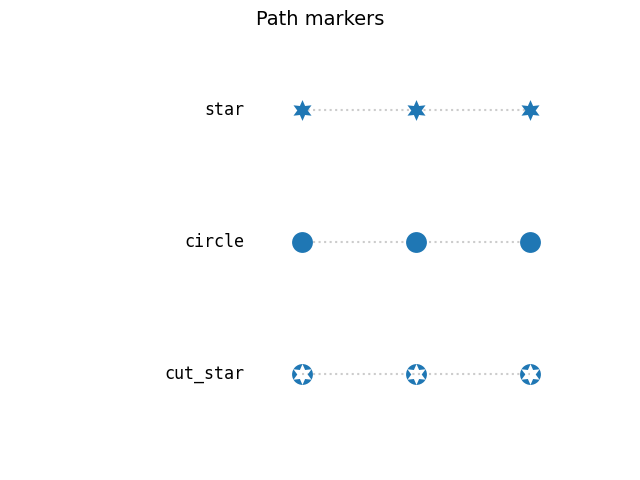
使用变换进行高级标记修改
可以通过将转换传递给 MarkerStyle 构造函数来修改标记。以下示例显示了如何将提供的旋转应用于多个标记形状。
common_style = {k: v for k, v in filled_marker_style.items() if k != 'marker'}
angles = [0, 10, 20, 30, 45, 60, 90]
fig, ax = plt.subplots()
fig.suptitle('Rotated markers', fontsize=14)
ax.text(-0.5, 0, 'Filled marker', **text_style)
for x, theta in enumerate(angles):
t = Affine2D().rotate_deg(theta)
ax.plot(x, 0, marker=MarkerStyle('o', 'left', t), **common_style)
ax.text(-0.5, 1, 'Un-filled marker', **text_style)
for x, theta in enumerate(angles):
t = Affine2D().rotate_deg(theta)
ax.plot(x, 1, marker=MarkerStyle('1', 'left', t), **common_style)
ax.text(-0.5, 2, 'Equation marker', **text_style)
for x, theta in enumerate(angles):
t = Affine2D().rotate_deg(theta)
eq = r'$\frac{1}{x}$'
ax.plot(x, 2, marker=MarkerStyle(eq, 'left', t), **common_style)
for x, theta in enumerate(angles):
ax.text(x, 2.5, f"{theta}°", horizontalalignment="center")
format_axes(ax)
fig.tight_layout()
plt.show()

设置标记帽样式和连接样式#
标记具有默认的上限和连接样式,但可以在创建 MarkerStyle 时自定义这些样式。
from matplotlib.markers import JoinStyle, CapStyle
marker_inner = dict(markersize=35,
markerfacecolor='tab:blue',
markerfacecoloralt='lightsteelblue',
markeredgecolor='brown',
markeredgewidth=8,
)
marker_outer = dict(markersize=35,
markerfacecolor='tab:blue',
markerfacecoloralt='lightsteelblue',
markeredgecolor='white',
markeredgewidth=1,
)
fig, ax = plt.subplots()
fig.suptitle('Marker CapStyle', fontsize=14)
fig.subplots_adjust(left=0.1)
for y, cap_style in enumerate(CapStyle):
ax.text(-0.5, y, cap_style.name, **text_style)
for x, theta in enumerate(angles):
t = Affine2D().rotate_deg(theta)
m = MarkerStyle('1', transform=t, capstyle=cap_style)
ax.plot(x, y, marker=m, **marker_inner)
ax.plot(x, y, marker=m, **marker_outer)
ax.text(x, len(CapStyle) - .5, f'{theta}°', ha='center')
format_axes(ax)
plt.show()
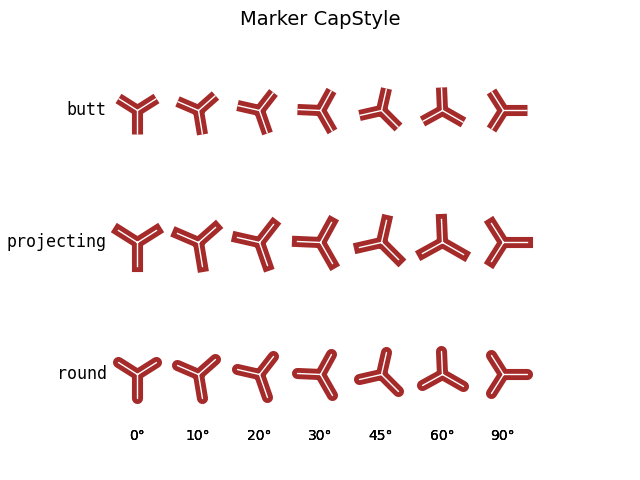
修改连接样式:
fig, ax = plt.subplots()
fig.suptitle('Marker JoinStyle', fontsize=14)
fig.subplots_adjust(left=0.05)
for y, join_style in enumerate(JoinStyle):
ax.text(-0.5, y, join_style.name, **text_style)
for x, theta in enumerate(angles):
t = Affine2D().rotate_deg(theta)
m = MarkerStyle('*', transform=t, joinstyle=join_style)
ax.plot(x, y, marker=m, **marker_inner)
ax.text(x, len(JoinStyle) - .5, f'{theta}°', ha='center')
format_axes(ax)
plt.show()

脚本总运行时间:(0分2.550秒)